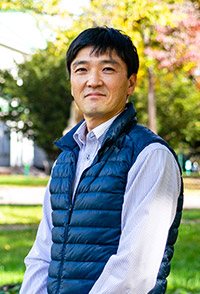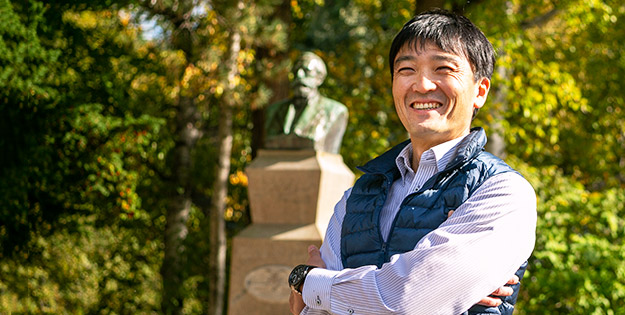Junjiro Negishi Prof.
Prof.
Junjiro Negishi
Faculty
Faculty of Environmental Earth Science Faculty of Environmental Earth Science Integrated Environmental Science Conservation on Natural Environments
Research field
- Environmental science/Agricultural science / Biological resource conservation
- Life sciences / Forest science
- Environmental science/Agricultural science / Landscape science
- Environmental science/Agricultural science / Environmental agriculture

Major research field
My research focuses on river ecology and hydrogeomorphology. I am gathering scientific information necessary to sustainably utilize ecosystems—that is, to properly manage ecosystems—in freshwater areas. Target creatures include a variety of animals ranging from invertebrates (e.g., insects, crustaceans, shellfish) to vertebrates (e.g., fish). I analyze their community structures and population dynamics as well as their chemical composition and genetic information. Approaches to this discipline often combine field surveys with laboratory experiments. Target research areas of the PARE domestic program encompass the Ishikari River and the Tokachi River. We are also involved in a global-scale multipoint simultaneous measurement project among other projects.
Expectations for students planning to participate in the PARE program
I want students to achieve personal growth while learning for themselves how vast the world is, how fascinating nations around the world are, and how complicated the environmental issues the earth is facing are. By interacting with faculty members and other students from different backgrounds as well as by learning and engaging in tasks together, students will be able to recognize their own deficiencies. It is my hope that their participation in this program will be instrumental in compensating for these deficiencies. In addition, students are expected to identify their strengths and further develop them. I believe they will grow to become human resources capable of immersing themselves in discussions with others, establish lifelong relationships with them, and thereby come up with solutions to environmental issues.
Your most memorable school event thus far
One example of an event that left an impression on me would be the Spring School held in Bandung, Indonesia. I assumed this field trip would take place in hot weather. Surprisingly, however, camping at high altitude meant it was cold enough to need a down jacket. I learn something new every time I go to a field site. I was really impressed by how confident and adept the students were when making their final presentations. It was almost as if they weren’t the same students I met the first day.
Expectations for expansion of the program going forward
I would like to see participants with various interests apply so that this program can provide a wide variety of content to them. More specifically, I think measures should be taken to encourage students other than those from member consortium universities to participate in this program, or to improve the program content by leveraging the strengths of research conducted by host universities. We need to forge a vertical network that allows former participants to deliver lectures for this program while working as members of society. Furthermore, my wish is that this program will create a path for participants that will lead to future careers as researchers; that is, I hope student participants will be able to embrace this as an opportunity to play an active role as a researcher while supporting host teachers carrying out research activities.

